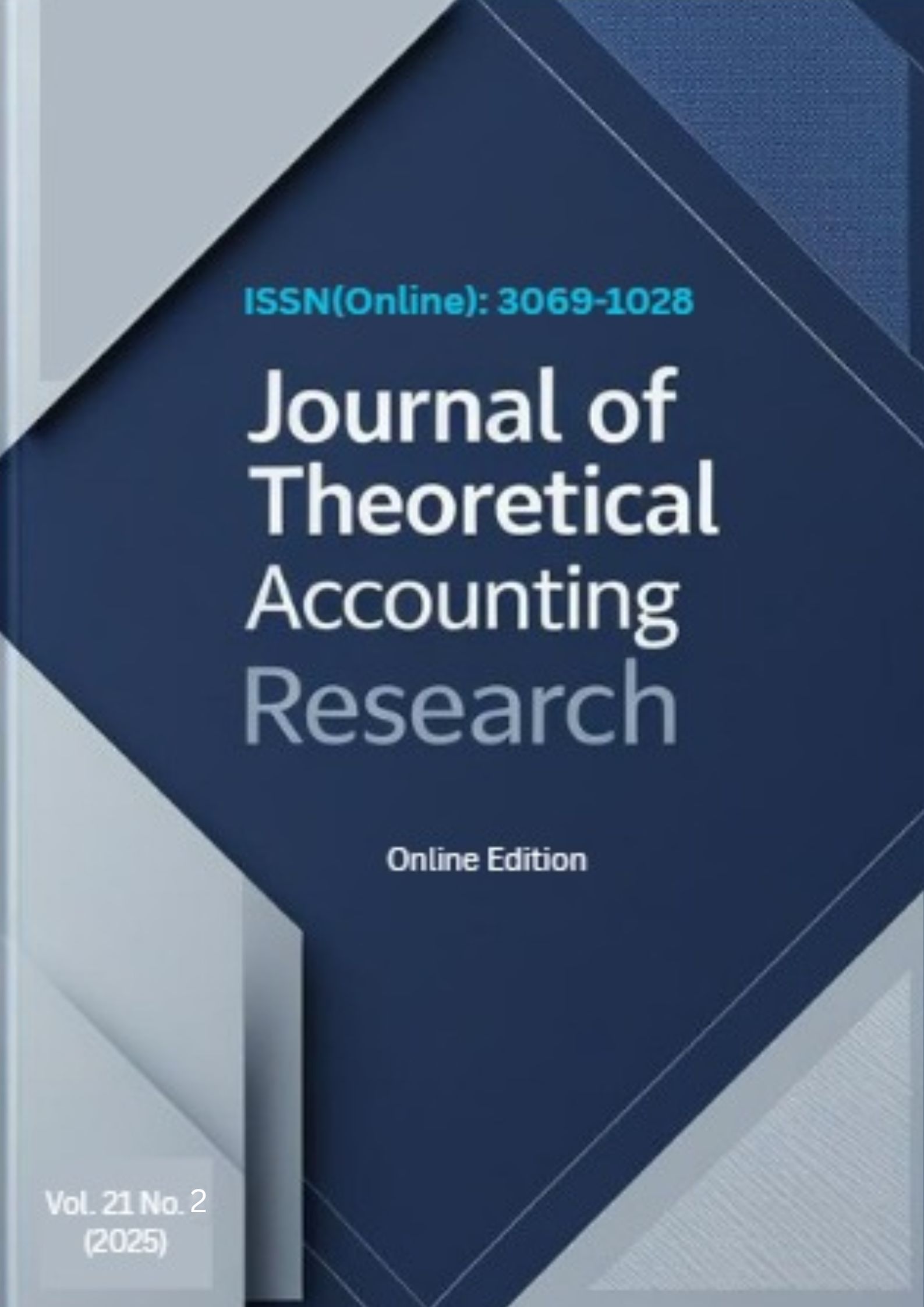The Role of Accounting Information in Economic Decision-Making: A Market-Based Theoretical Perspective
Main Article Content
Abstract
ccounting information is a central determinant of economic decision-making that guides investor choice, capital resource allocation, and market efficiency. This article is an integrative market-based theoretical framework that synthesizes concepts from agency theory, signaling theory, and information economics to address how accounting information shapes economic outcomes. The methodology uses conceptual synthesis through secondary sources in top-impact journals. The findings indicate that accounting information plays multifaceted roles such as mitigating information asymmetry, improving governance, and enabling correct valuation. Tables and models present the differential application of accounting information by investors, creditors, and managers, and its fit with decision theory. The evidence also highlights the mediating influence of institutional variables like audit quality and regulatory requirements. This theoretical model improves insight into accounting's effect on firm-level and macroeconomic choices. The findings provide implications for practice, policy, and future research in a fast-changing financial reporting landscape.
Article Details
Section

This work is licensed under a Creative Commons Attribution 4.0 International License.
How to Cite
References
1. Almaqtari, F. A., Hashed, A. A., & Shamim, M. (2021). Impact of corporate governance mechanism on IFRS adoption: A comparative study of Saudi Arabia, Oman, and the United Arab Emirates. Heliyon, 7(1), e05848. https://doi.org/10.1016/j.heliyon.2020.e05848
2. Biehl, H., Bleibtreu, C., & Stefani, U. (2024). The real effects of financial reporting: Evidence and suggestions for future research. Journal of International Accounting, Auditing and Taxation, 54, 100594. https://doi.org/10.1016/j.intaccaudtax.2023.100594
3. Blair, P. Q., & Chung, B. W. (2025). Job market signaling through occupational licensing. Review of Economics and Statistics, 107(2), 338-354.
4. Boubakri, N., Chen, R., El Ghoul, S., Guedhami, O., & Nash, R. (2020). State ownership and stock liquidity: Evidence from privatization. Journal of Corporate Finance, 65, 101763. https://doi.org/10.1016/j.jcorpfin.2020.101763
5. Camisón, C., Clemente, J. A., & Camisón-Haba, S. (2022). Asset tangibility, information asymmetries and intangibles as determinants of family firms leverage. Review of Managerial Science, 16(7), 2047–2082. https://doi.org/10.1007/s11846-022-00522-y
6. Cao, Z., & Geman, H. (2025). A hype-adjusted probability measure for NLP stock return forecasting. Frontiers in artificial intelligence, 8, 1527180. https://doi.org/10.3389/frai.2025.1527180
7. Christensen, H. B., Hail, L., & Leuz, C. (2021). Mandatory CSR and sustainability reporting: economic analysis and literature review. Review of Accounting Studies, 26(3), 1176–1248. https://doi.org/10.1007/s11142-021-09609-5
8. Eduah, N., Debrah, G., Aidoo, E. K., & Mettle, F. O. (2024). Comparative analysis of stochastic seasonality, January effect and market efficiency between emerging and industrialized markets. Heliyon, 10(7), e28301. https://doi.org/10.1016/j.heliyon.2024.e28301
9. Fülbier, R. U., & Sellhorn, T. (2023). Understanding and improving the language of business: How accounting and corporate reporting research can better serve business and society. Journal of business economics, 1–36. Advance online publication. https://doi.org/10.1007/s11573-023-01158-4
10. Herghiligiu, I. V., Dicu, R. M., Aevoae, G. M., Sahlian, D. N., Popa, A. F., & Robu, I. B. (2024). Circular causality analysis of corporate performance and accounting quality in M&As. PloS one, 19(10), e0308608. https://doi.org/10.1371/journal.pone.0308608
11. Histen M. J. (2022). Taking Information Seriously: A Firm-side Interpretation of Risk Factor Disclosure. International Advances in Economic Research, 28(3-4), 119–131. https://doi.org/10.1007/s11294-022-09856-5
12. Jansen, K., Michiels, A., Voordeckers, W., & Steijvers, T. (2022). Financing decisions in private family firms: a family firm pecking order. Small business economics, 1–21. Advance online publication. https://doi.org/10.1007/s11187-022-00711-9
13. Mohamed Amer, A. M., Azimli, A., & Wole Adedokun, M. (2024). Can IFRS adoption mitigate earnings management in an emerging market?. Heliyon, 10(19), e38226. https://doi.org/10.1016/j.heliyon.2024.e38226
14. Moolkham M. (2024). The impact of sustainable development on the relevance of accounting information and financial activities: Evidence from Thailand. PloS one, 19(11), e0313299. https://doi.org/10.1371/journal.pone.0313299
15. Nguyen, H. T. T., Nguyen, H. T. T., & Nguyen, C. V. (2023). Analysis of factors affecting the adoption of IFRS in an emerging economy. Heliyon, 9(6), e17331. https://doi.org/10.1016/j.heliyon.2023.e17331
16. Prenestini, A., Calciolari, S., & Rota, A. (2024). Keep-or-drop multidimensional control systems in professional organisations: evidence on the use of the balanced scorecard in healthcare. Journal of health organization and management, 38(9), 157–174. https://doi.org/10.1108/JHOM-09-2023-0287
17. Ruggiero, P., Sorrentino, D., & Mussari, R. (2022). Earnings management in state-owned enterprises: bringing publicness back in. Journal of Management and Governance, 26(4), 1277–1313. https://doi.org/10.1007/s10997-021-09589-3
18. Schnegg, M., & Möller, K. (2022). Strategies for data analytics projects in business performance forecasting: a field study. Journal of management control, 33(2), 241–271. https://doi.org/10.1007/s00187-022-00338-7
19. Wang H. (2024). A study on the impact of enterprise digital transformation on informed trading. PloS one, 19(12), e0313623. https://doi.org/10.1371/journal.pone.0313623
20. Xia, H., Weng, J., Boubaker, S., Zhang, Z., & Jasimuddin, S. M. (2022). Cross-influence of information and risk effects on the IPO market: exploring risk disclosure with a machine learning approach. Annals of operations research, 1–37. Advance online publication. https://doi.org/10.1007/s10479-022-05012-8
21. Zhang, T., Zhang, J., & Tu, S. (2024). An Empirical Study on Corporate ESG Behavior and Employee Satisfaction: A Moderating Mediation Model. Behavioral sciences (Basel, Switzerland), 14(4), 274. https://doi.org/10.3390/bs14040274
22. Zou, W., & Othman, A. (2024). The impact of accounting conservatism on enterprise innovation investment. Heliyon, 10(16), e36106. https://doi.org/10.1016/j.heliyon.2024.e36106
